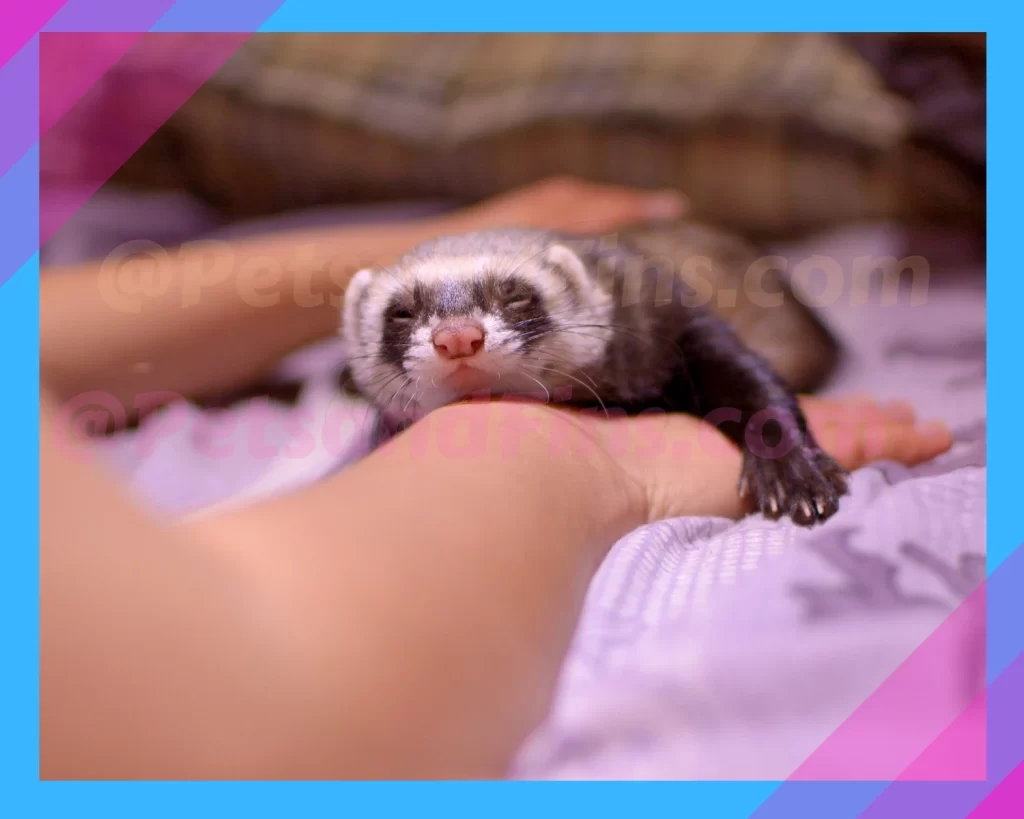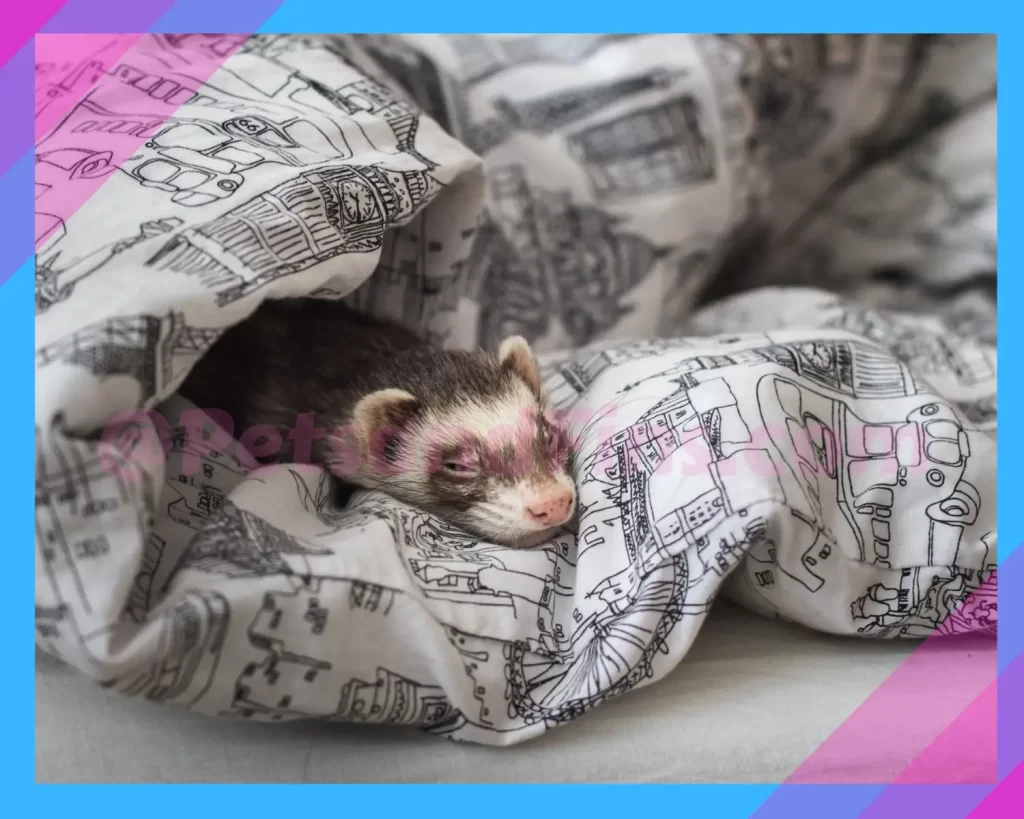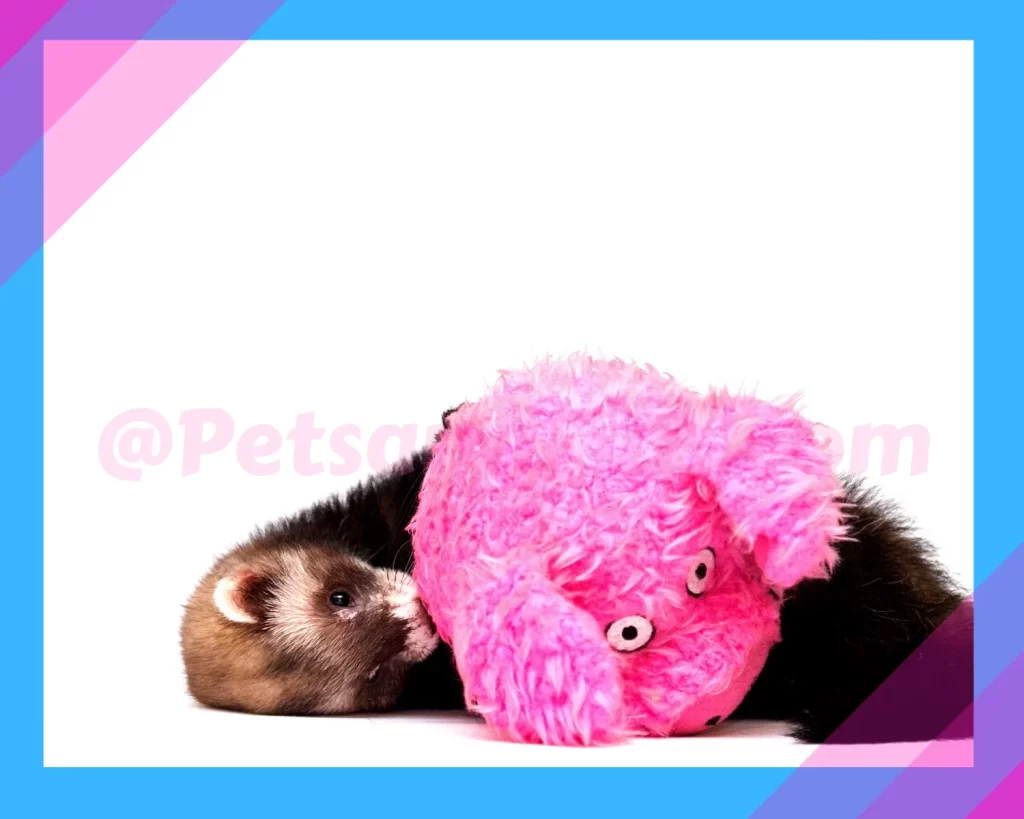Do you own a ferret? If not, maybe you’ve been considering getting one. They’re adorable little creatures, after all! But before making the decision to bring one into your home, it’s important to do your research and learn about their natural habits, including their sleeping patterns.
In this post, we will take a look at whether or not ferrets are naturally nocturnal animals. Spoiler alert: They are not! Keep reading for more details. 😉

Nocturnal animals are those that are active during the night and sleep during the day.
Ferrets are not nocturnal, they are crepuscular, which means that instead of being active during the night like other animals, ferrets prefer to be more active in the twilight hours (i.e. dawn and dusk). They sleep up to 18 hours a day.
They are most active at dawn or dusk when it is not too hot or cold outside. This is because these hours provide them with the right amount of light, ideal conditions, and suitable temperatures for hunting prey.
What Exactly Are Nocturnal Animals?
Nocturnal animals are those that are active during the night and sleep during the day. Most of these animals have evolved to have heightened senses such as hearing, smell, or sight, which helps them hunt prey or escape predators at night.
Some common nocturnal animals include bats, raccoons, opossums, owls, etc .
What Exactly Are Crepuscular Animals?
Crepuscular is derived from Latin words meaning “twilight.” This is why their activity peaks in the early morning and evening when it’s not too hot outside, but also before sunrise or after sunset when there’s still light available.
Crepuscular animals are those that are active during the twilight hours, which is defined as the time between night and day when there’s still some light but it’s not yet daytime. So these animals are more active in the morning and evening than they are at night.
Some common crepuscular animals include deer, rabbits, ferrets, hamsters, etc .
While ferrets may be crepuscular instead of nocturnal, that doesn’t mean they don’t sleep during the day! In fact, they usually sleep for around 18 hours a day. This is because their activity levels naturally decrease as it gets hotter or colder outside.

Are Ferrets Crepuscular ?
Ferrets are crepuscular animals, which means that they are most active during the twilight hours. This doesn’t mean that ferrets can’t be active during the day, it just means that they are naturally inclined to be more active at dawn and dusk.
So if you’ve ever wondered why your ferret is particularly active in the early mornings or late evenings, now you know!

This may come as a surprise to many ferret owners, who often think of their ferrets as being more active during the nighttime or daytime. But in fact, ferrets are naturally inclined to be more active at those times when the light is softer and there is less activity happening around them.
So if you’re looking for times when your ferret is likely to be most active, try taking them out early in the morning or evening. You may be surprised at how much fun you can have with your little friend!

What Is the Usual Sleeping Pattern Of Ferrets?
Ferrets sleep up to 18 hours a day.They are famous for the 18 hours they sleep. It’s not at a stretch, and usually ferrets have an hour of awake time for every four or five hours spent sleeping!
In any given period of 24 hours, you’ll find these active little guys going through their high activity period for at least 4 hours. This means that in one 24-hour period, you can count on your ferret friend staying active with around 4-5 hours of high activity periods throughout the whole course of it .
They prefer to spend their time sleeping in small, dark spaces that feel safe, such as wooden boxes, hollow logs, etc .

Ferrets, like many other mammals, experience two stages of sleep, called REM and non-REM sleep. Non-REM type 1 sleep is when the animal becomes progressively less responsive to outside stimuli and its brain activity slows down. The body’s temperature drops slightly, and blood pressure also decreases.
Non-REM type 2 sleep is characterized by a slowing in respiratory rate but an elevated heart rate; heavy muscles; twitching around the nose or paws; etc., though movement can still stop for periods of time that last up to 30 seconds each. Heart rates go up during this period too, but they’re slower than during wakefulness. This stage makes up about 50% of an animal’s sleep time.
The REM state is when brain activity ramps up, and the eyes move rapidly from side to side beneath closed lids. Breathing and heart rate also speed up during this period, as do muscle contractions–though animals usually remain still otherwise. This phase typically accounts for around 25% of total sleep time in mammals .
Ferrets usually enter into REM type sleep within a few minutes of dozing off and spend the majority of their slumber in that state. Generally, though, ferret sleep is broadly distributed across the 24 hour period. Ferrets go through periods of rapid eye movement (REM) during their daytime naps, which indicates that ferrets dream too.

Do Ferrets Have Adapting Sleeping Patterns ?
Ferrets have the ability to change their sleep timings, and most will adapt their sleeping pattern to that of their owner. If their owner is up and about during the day, they will be more active during the day also.
Similarly, if their owner sleeps during the day and is up at night, ferrets will become more nocturnal to match that of their owner. Ferrets have a high level of adaptability when it comes to sleeping, and this means that they can usually conform to whatever sleep schedule their owner has.

Just like people, ferrets can have different sleeping patterns. Some ferrets may be more active during the day, while others are more active at night. This is because some ferrets can adapt better to their environment and changing schedules than others.
If you find that your ferret isn’t adapting well to changes in his environment, there are a few things you can do to help him sleep better. First, try creating a dark and quiet space for him to sleep in. Ferrets prefer small, enclosed spaces where they feel safe and secure. You can also try putting him on a regular sleep schedule by feeding him and taking him outside at the same time every day. This will help his body get used to the routine and make it easier for him to fall asleep.
How To Help Your Ferret Sleep Better?
If you find that your ferret is waking up frequently during the night, try setting aside more time for him to play and run around in his enclosure so that he gets worn out. You can also try putting him on a regular schedule so that he knows when it is bedtime each day.
The most important thing about having a ferret is to be flexible with them! Ferrets are very adaptable creatures who will adjust their sleeping patterns depending on what works best for their owners (and vice versa). The key here is routine.If you keep things consistent, then it shouldn’t take long at all before you both develop an ideal sleeping pattern together .
If your ferret is having trouble sleeping, you may want to try changing his environment. Try creating a dark and quiet space for him to sleep in, like a small box or cushion. Ferrets prefer small, enclosed spaces where they feel safe and secure.
You can also put him on a regular sleep schedule by feeding him and taking him outside at the same time every day. This will help his body get used to the routine and make it easier for him to fall asleep .
Additionally , if your ferret has recently been introduced into another animal’s territory (e . g., got adopted), he might be more active out of fear during certain times of the day than others as he tries to avoid confrontations with other animals . He’ll eventually get used to the new environment and settle down as it becomes familiar.

Creating The Right Environment For Ferrets At Home:
People who keep ferrets at home need to establish an environment that is conducive to the animal’s natural crepuscular habits. They are crepuscular animals by nature, which means they are active in the evening and early morning hours. It’s crucial to create an environment at home that allows for this sort of conduct as well!

- Avoid Using Bright Lighting: It’s advisable not to use bright lighting in order to keep their environment as close to their natural habitat as possible. Make sure they have a dark place to sleep and lower all of the lights in their room in the early evening.
- Avoid Loud Sounds:Loud sounds and noises should also be avoided at all costs. Make sure there are no unexpected loud sounds around your house, particularly if you have other pets living with you. This will allow your pets to feel more secure.
- Try Investing In Dark Blinds: If you’re going to be gone for an extended amount of time, consider investing in some blackout blinds to help them feel more comfortable when sleeping throughout the day/night. This will ensure that they may relax peacefully at any time since they will always have darkness to fall back on.
- Allow Physical Exercise During Twilight Hours: You should consider allowing your ferret to run around during the twilight hours.This would ensure the good levels of activity that are required to maintain excellent health.
- Allow Twilight Playtime: It is very crucial that you allow your favourite to have twilight play time .A ferret that is active at dusk and in the morning may appreciate playing with their toys during these hours since it will simulate them.

- Provide Access To Food And Water 24x 7:If you want to keep your pet’s natural crepuscular activity patterns going, you’ll need to provide him or her with adequate food and water at the right times! This might lead to an even better lifestyle overall!

Wrapping Up
Ferrets are not nocturnal. They’re crepuscular, meaning they have a specific activity pattern that is neither diurnal nor nocturnal but somewhere in between, so ferrets do well being active during the day and at night.
In the wild, their hunting cycles follow this behavior to coincide with when prey will be most vulnerable or least alert. This helps them to avoid detection from predators while also maximizing their chances of success when chasing down food sources like rodents and rabbits.
I hope this blog post has answered any sleep-related questions you had about these adorable little critters! If there is anything else I didn’t cover in detail or if you still have more specific questions on this topic, feel free to reach out with your concerns by clicking the contact button below. Our team of experts will be happy to help answer any queries related to ferret behavior and care!
XoXo
Genie
